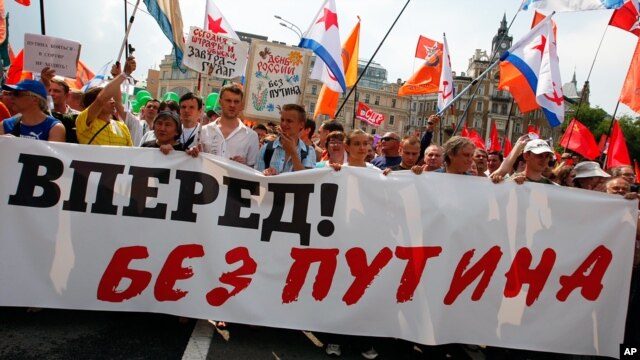
Protesters carry a banner reading, "Russia Go Forward without Putin" in Moscow, June 12, 2012.
Tens of thousands of Russians have marched in an opposition rally in the capital Moscow to protest the return of Vladimir Putin to the Russian presidency, despite Russian authorities forcing several protest leaders to appear for questioning as the demonstration began.
Tuesday's rally was the first to be called by the opposition since Putin took office on May 7 and began tightening a government crackdown on dissent. A VOA correspondent on the scene estimated that tens of thousands of people marched along a Moscow boulevard toward Sakharov Avenue. Protest leader Sergei Udaltsov put the turnout at 100,000, while police estimates say up to 20,000 participated.
The VOA correspondent said the rally, which was held on the Russia Day national holiday, was peaceful and included a diverse group of participants, from nationalists to communists and liberals. He said thousands of police had been deployed to secure the march, which the government had authorized.
President Putin said in comments marking the national holiday that Russia cannot accept anything that weakens the country or divides society.
Protest leader Sergei Udaltsov was among four protest leaders summoned by police to be questioned on Tuesday about Moscow's last big opposition rally, which turned violent on the eve of Putin's inauguration. Udaltsov ignored the summons and joined the start of the latest rally, while dissidents Alexei Navalny, Ilya Yashin and Ksenia Sobchak appeared at the investigation office as ordered.
Russian news agencies said investigators had no plans to sanction Udaltsov for skipping the questioning.
Russian police raided the homes of all four dissidents on Monday, barging into their apartments early in the morning, ransacking their belongings and taking away computers and other possessions.
Tuesday's protest was timed to coincide with Russia Day, which marks the occasion of June 12, 1990, when Russian lawmakers decided that Russian laws should take precedence over those of the Soviet Union. Russian Internet users angered by the crackdown also likened it to the repression of Soviet dictator Josef Stalin, posting Twitter messages mentioning 1937, the year of his greatest repression.
U.S. State Department spokeswoman Victoria Nuland also criticized the raids, saying Washington is "deeply concerned by the apparent harassment" of the opposition leaders on the eve of planned demonstrations and the "arbitrary use of law enforcement."
In another move to pressure the opposition, Putin signed a law on Friday that dramatically increases fines on people who participate in unauthorized protest actions. Under the law, protesters held responsible for physical injury or property damage face penalties of up to $9,000, equivalent to the country's average annual salary.
Organizers of Tuesday's march expressed concern that minor violations of their government permit would give security forces a pretext to make arrests.
Putin was elected to a record third presidential term in March. He served two terms as president from 2000 to 2008 before switching to the role of prime minister due to constitutional limits on consecutive presidential terms. A subsequent constitutional amendment extended the term of a Russian president to two consecutive six-year periods, meaning Mr. Putin could stay in power until 2024. |
|
